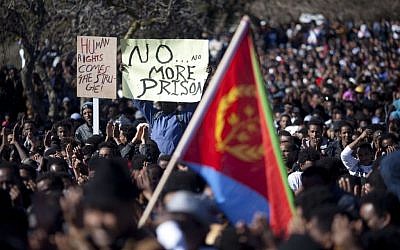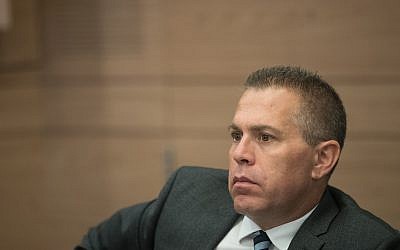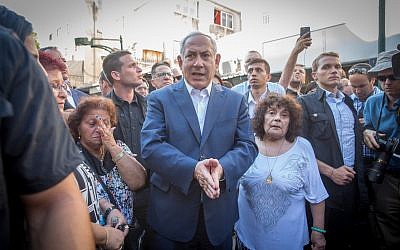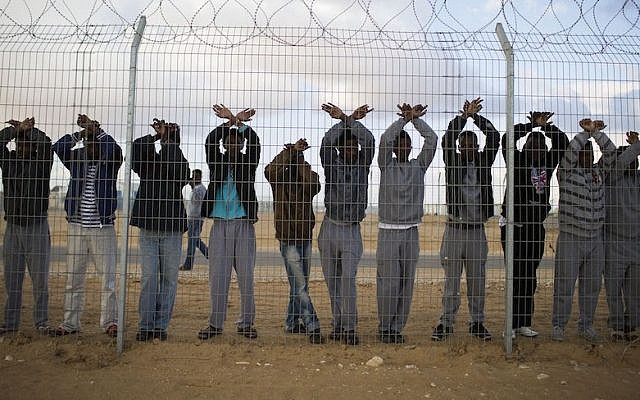The cabinet voted on Sunday to close the Holot migrant detention center in southern Israel, as Prime Minister Benjamin Netanyahu announced an agreement to deport 40,000 Africans who entered the country illegally.
Ministers unanimously approved the plans to shutter Holot and gave migrants a three-month deadline to leave the country or face deportation, said the interior and public security ministries.
“The infiltrators will have the option to be imprisoned or leave the country,” the Public Security ministry said in a statement.
Official figures from June 30 show a total of 38,043 African migrants in the country.
They include 27,494 Eritreans and 7,869 Sudanese, and their presence in south Tel Aviv has raised discontent among Israelis there and elsewhere.
The proposal by Interior Minister Aryeh Deri and Public Security Minister Gilad Erdan came in response to a High Court of Justice ruling in late August that backed Israel’s controversial practice of deporting illegal migrants to an unnamed third country.

More than 10,000 African migrants rallied outside the Knesset in Jerusalem on January 8, 2014 to call for their recognition as refugees. (AP Photo/Ariel Schalit)
Netanyahu said the deportations were being carried out in line with an international agreement allowing Israel to deport migrants without their consent.
Speaking ahead of Sunday’s vote, Netanyahu noted that after building a fence on the Egyptian border and deporting some 20,000 African migrants through various deals, Israel has reached the third stage of its efforts — “accelerated removal.”
“This removal is taking place thanks to an international agreement I reached that enables us to remove the 40,000 infiltrators remaining, remove them without their consent,” he told ministers.
“This will enable us to close down Holot and allocate some of the large funds going there to inspectors and removing more people,” said Netanyahu.
Holot, an open facility in the desert that can host 1,200 migrants who are allowed to leave to work during the day, would be closed three months from December 16, according to the decision.
A Public Ssecurity ministry spokesman said an extension to that deadline would be set if necessary.
“The decision to close the Holot facility will only be made if, and after, it appears that the deportation of infiltrators to a third country is being realized,” Erdan said.
On Twitter, Erdan charged that Holot had become a “hotel for infiltrators at the public’s expense.”
He told Israel Radio on Sunday that the facility cost NIS 240 million ($68 million) per year and that the government had to weigh — after the High Court had relaxed the restrictions on inmates in a number of rulings — whether life at Holot was a sufficient disincentive to migrants to stay in Israel.
Erdan dismissed expressions of “serious concern” voiced Friday by the
UN refugee agency, which said Israel had “legal obligations to protect refugees and other persons in need of international protection.”

Public Security Minister Gilad Erdan attends an Internal Affairs committee meeting in the Knesset, October 31, 2017. (Yonatan Sindel/Flash90)
He said that the third countries which have agreed to receive the deportees were safe and that claims by aid agencies, which he called “left-wing organizations in costume,” were false and focused on interests other than those of the Israeli public.
He added that imprisonment for those who refused deportation, along with other tactics, such as forbidding migrants from sending wages back home, would hopefully encourage migrants to understand that there was no advantage to staying in Israel.
Yonatan Jakubowicz, an anti-migrant activist, said the closure of Holot was premature as it would not end illegal entry into Israel.
“Illegal immigration is a global phenomenon that is not going to disappear and the State of Israel must have facilities to cope with this phenomenon over time, as in any normal country,” he said.
Neither Erdan nor Netanyahu gave details about the deal or the third country.
Israel tacitly recognizes that Sudanese and Eritreans cannot be returned to their dangerous homelands, so it has signed deals with third countries, which agree to accept departing migrants on condition they consent to the arrangement, according to activists.
In August, the High Court of Justice approved the emigration policy, but also ruled that Israeli authorities had to first ensure that the countries to which migrants were being deported were safe. Though the state has not named the third countries, they have been identified in media reports as Rwanda and Uganda.
Expulsion to a third country is largely unprecedented in the Western world. Italy and Australia signed similar agreements with third-party countries — Italy with Libya, and Australia with Malaysia — but both proposals were shot down by local courts. In both cases, courts ruled the bills inconsistent with international law and the 1951 UN convention on refugees — to which Israel is also a party.
The Population and Immigration Authority says more than 40,000 illegal African migrants are residing in Israel as of 2016, almost all from Eritrea and Sudan. Many live in the poorer neighborhoods of southern Tel Aviv, with some blaming them for rising crime rates in the city.

Prime Minister Benjamin Netanyahu meets with residents of south Tel Aviv during a tour in the neighborhood, August 31, 2017. (Miriam Alster/Flash90)
Many migrants say they are fleeing conflict and persecution and are seeking refugee status. Israeli officials contend they are economic migrants, and have resisted calls to recognize them as refugees.
Marissa Newman contributed to this report.



